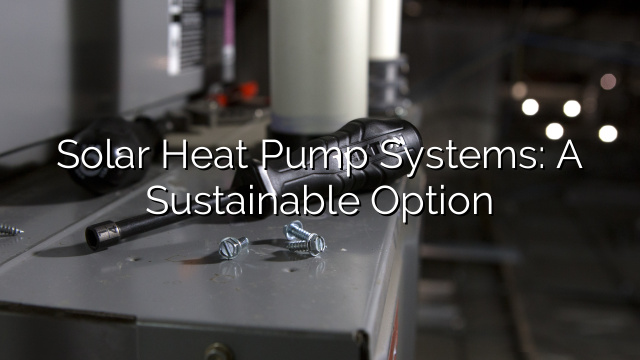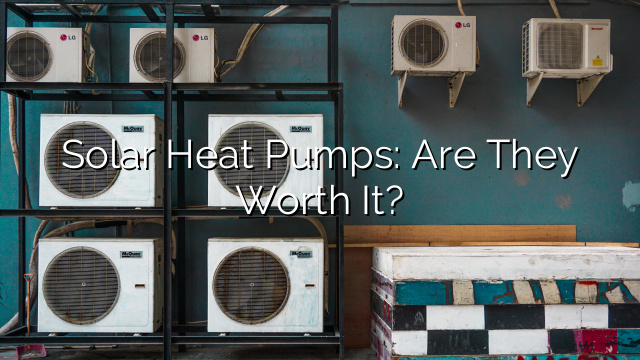If you’re looking for an eco-friendly and cost-effective way to heat your home, then a solar heat pump system might be the perfect solution for you. Solar heat pump systems use the sun’s energy to heat your home, reducing your carbon footprint and saving you money on your energy bills. In this beginner’s guide, we’ll walk you through everything you need to know about solar heat pump systems.
What is a Solar Heat Pump?
A solar heat pump is a system that combines two existing technologies – solar thermal panels and heat pumps. Solar thermal panels capture the sun’s heat and transfer it to a fluid, which is then used to heat water or air. The heat pump then extracts the heat from the fluid and distributes it throughout your home. This combination of solar thermal panels and heat pumps allows you to heat your home using renewable energy.
How does a Solar Heat Pump System work?
1. Solar Thermal Panels: The solar thermal panels collect the sun’s heat and transfer it to a fluid, such as water or an anti-freeze solution. These panels are typically installed on your roof or mounted on a ground-mounted system, where they can capture the most sunlight.
2. Heat Pump: The heat pump extracts the heat from the fluid and transfers it to either air or water. The type of heat pump used will depend on whether you want to heat your home or your water. Air source heat pumps extract heat from the surrounding air, while ground source heat pumps extract heat from the ground.
3. Distribution System: Once the heat is extracted from the fluid, it is distributed throughout your home using either a water-based or air-based distribution system. Water-based systems use radiators or underfloor heating, while air-based systems use ducts or vents.
Benefits of a Solar Heat Pump System
– Reduced Carbon Footprint: One of the biggest benefits of a solar heat pump system is that it greatly reduces your carbon footprint. By using renewable energy from the sun, you can significantly decrease your reliance on fossil fuels and lower your greenhouse gas emissions.
– Lower Energy Bills: Solar heat pump systems can also save you money on your energy bills. By harnessing the sun’s energy, you can reduce your reliance on traditional heating systems, which can be expensive to run. Additionally, many countries offer incentives and subsidies for installing solar heat pump systems, further reducing your costs.
– Increased Energy Independence: Solar heat pump systems provide you with increased energy independence. By generating your own renewable energy, you are no longer solely reliant on the grid for your heating needs. This can be especially beneficial during power outages or times of high demand on the grid.
Factors to Consider
– Location: The effectiveness of a solar heat pump system will depend on your location and the amount of sunlight you receive. Ideally, your location should receive a good amount of sunlight throughout the year to maximize the system’s efficiency.
– Space: Solar thermal panels can take up a significant amount of space, so you will need to have enough roof or ground space to accommodate them. If space is limited, you may need to consider alternative options or smaller systems.
– Budget: While solar heat pump systems can save you money in the long run, the initial installation costs can be expensive. It’s important to consider your budget and weigh the costs against the long-term benefits before making a decision.
Maintenance and Servicing
Like any heating system, solar heat pump systems require regular maintenance and servicing to ensure optimal performance. Here are a few key maintenance tasks:
– Cleaning: The solar thermal panels should be cleaned regularly to remove any dirt or debris that may hinder the absorption of sunlight.
– Fluid Check: The fluid used in the system should be checked for proper levels and quality.
– Heat Pump Servicing: The heat pump should be serviced by a qualified professional to ensure it is working efficiently and effectively.
– System Inspections: Regular inspections of the entire system should be conducted to identify any potential issues or leaks.
Conclusion
A solar heat pump system offers a green and cost-effective way to heat your home. By harnessing the sun’s energy, you can reduce your carbon footprint, lower your energy bills, and increase your energy independence. Consider the factors mentioned in this guide and consult with a professional to determine if a solar heat pump system is the right choice for your home. With proper maintenance and servicing, your solar heat pump system can provide you with years of reliable and sustainable heating.














